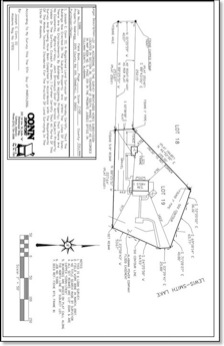Loan Survey:

Mortgage surveys are essential part of purchasing a property, though only a basic mortgage survey is required on the mortgage lenders behalf. Below are a summary of the three types of mortgage surveys.
Basic Mortgage Valuation
When you arrange your mortgage, your mortgage lender will commission a surveyor to carry out a basic mortgage valuation, which is a limited check on the property to ensure the property is worth the money the lender is lending you. You will normally have to pay a fee upwards of $300, depending on the size and purchase price of the property, although some lenders may waive the valuation fee as an incentive to secure your mortgage.
This valuation is not a full survey and is unlikely to go into detail about the state of the property. There may be structural problems in the property that would cost a huge amount to put right that simply won’t be picked up. The majority of home buyers rely on the lender’s mortgage valuation alone, but the Council of Mortgage Lenders strongly advise that you get a more detailed survey done before you purchase a property.
Homebuyer’s surveys and building surveys
The Royal Institution of Chartered Surveyors (RICS) recommends that all home buyer's commission a homebuyer's survey or a comprehensive building survey. A homebuyer's survey (also known as a homebuyer’s report) is a survey done to a standard format set out by RICS. It’s most suitable for conventional properties built within the last 150 years and are in reasonable condition. Wiring, drainage and gas are not covered, so you may want a specialist to check these as well. Homebuyer’s surveys are not usually suitable for properties in need of renovation, or if you’re planning major alterations. Your mortgage lender’s surveyor will normally be willing to do the mortgage valuation and the homebuyer’s survey at the same time which will save you money on the cost of commissioning both separately.
Building Survey
The most thorough report is a building survey and is a full structural inspection of a property. It is suitable for all properties, especially: listed buildings; older properties; buildings constructed in an unusual way, however old they are; properties you plan to renovate or alter in any way; and properties that have already had extensive alterations. As with the homebuyer’s survey, if the surveyor you instruct is acceptable to your mortgage lender, the cost of a separate valuation may be avoided. In practice very few of the major mortgage lenders will allow you to instruct a surveyor to carry out a mortgage valuation. It is more common to instruct a building survey separately and have a basic survey from your mortgage lender, making the building survey much more expensive compared with homebuyer's survey carried out by the mortgage lender.
